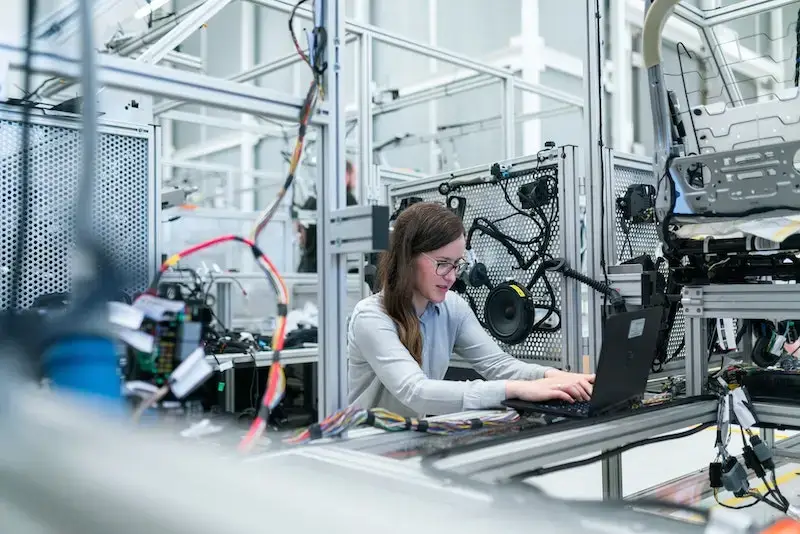Should High School Students Receive a “Tech-Heavy” Education?

A couple of weeks ago, I wrote about the technology of ChatGPT and whether or not high school students should use the AI chatbot to write their school papers. (Read that here.)
Let’s return to a related question: how “tech-heavy” should a high school education be?
Of course, the first step is to define what we mean by “tech-heavy”. I’m using this term somewhat loosely. One person’s “tech-heavy” may be another’s “tech-light” and vice versa. In the context of the discussion around ChatGPT, another way of phrasing this question would be: what role should technology take in a high school education?
For our purposes, I’m not talking about methods. For example, this is not a question of whether a high schooler should take online courses or in-person courses. That’s a fair question to ask but not the one we’re asking here today.
This is more about the content of education. To use the example of ChatGPT, should we be teaching students how to use technology or should we teach them “old-fashioned” skills as if the ability to automate those skills didn’t exist?
This of course is also relative. For instance, washing machines have automated the washing of clothes and we no longer teach our students how to wash by hand. However, even if technology were to automate writing, there would still be a need to teach writing (as I argued here).
The future of education in your inbox.
Get productivity tips, commentary, and Unbound updates sent to you!
I think we can reach nuanced conclusions about the role of technology in high school education by understanding what we want said education to accomplish.
Preparing For Life
In many ways, high school is practice for the rest of life. Many students “launch” in their late teens or early twenties, making high school a critical period of final preparation before their launch.
In our modern world, life demands us (by and large at least) to interact with technology. As Unbound’s CEO, Jonathan Brush, has written, the internet has changed our educational goals and the skills needed to succeed. We no longer need to cram as many answers as possible into our brains. Instead, the key academic indicator of success is the ability to ask the right questions.
This paradigm shift is due in large part to the rise of internet technology which has made information overwhelmingly free and easy to access.
Therefore, as we seek to prepare our high school students for life in the real world we must take this into account. We must prepare them for the world as it is in 2023, not as it was in 2003. Learning to wisely and effectively use modern technology should be part of a high school student’s education since the chances are high that they will be required to use such technology in their later careers and other projects. This includes things like artificial intelligence.
All that said, the need for wisdom and discernment has not expired. In fact, with the rise of technology overtaking our daily lives, the need for wisdom is even more front and center. A high school curriculum should incorporate the ability to use modern technologies and simultaneously, a major part of that curriculum should focus on the wise use of said technologies.
Few high schoolers need to be “taught” how to use modern technology. Students can even pick up new technologies with a little techy intution. However, the bigger issue is wisdom and moderation in tech use. That is something that does not necessarily come naturally to a highschool student. Hence, it requires more intentional guidance.
Avoiding Loss of True Education
I won’t spend much time here because I developed a fuller approach to this topic here. I will say in summary though, that a “tech-heavy” education that focuses on teaching students to use things like AI to the detriment of “classical” academic skills like writing or even memorization is a short-sighted move.
Students need to be prepared for the real world which of course means the world as it is now. This necessarily means that their education must be contextualized to modern problems and solutions. But in another sense, being prepared for the real world has always required a few basic constants: things like critical thinking, wisdom, communication skills, and so on.
Our high school education should strike a balance here. We must contextualize education for modern circumstances which means we teach a “tech-heavy” education. On the other hand, our “tech-heavy” education must not be so tech-heavy that we erode other skills. These include things like in-person communication, writing, and critical thinking.
“Tech-Balanced”
So let’s end with this: high school students should receive a “tech-balanced” education. This means that they should be able to confidently use modern technology. They will doubtlessly be using it in future careers and personal projects. And yet wisdom, critical thinking, and “old-fashioned” analog skills should always complement this ability to use technology.
Ascend prepares students for the real world. Students learn through challenging personal projects in fields that interest them. To learn more, schedule a free consultation with our team.




